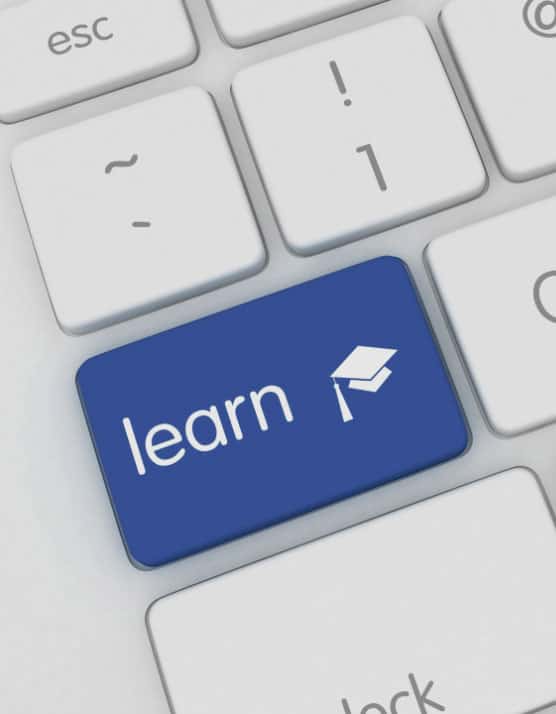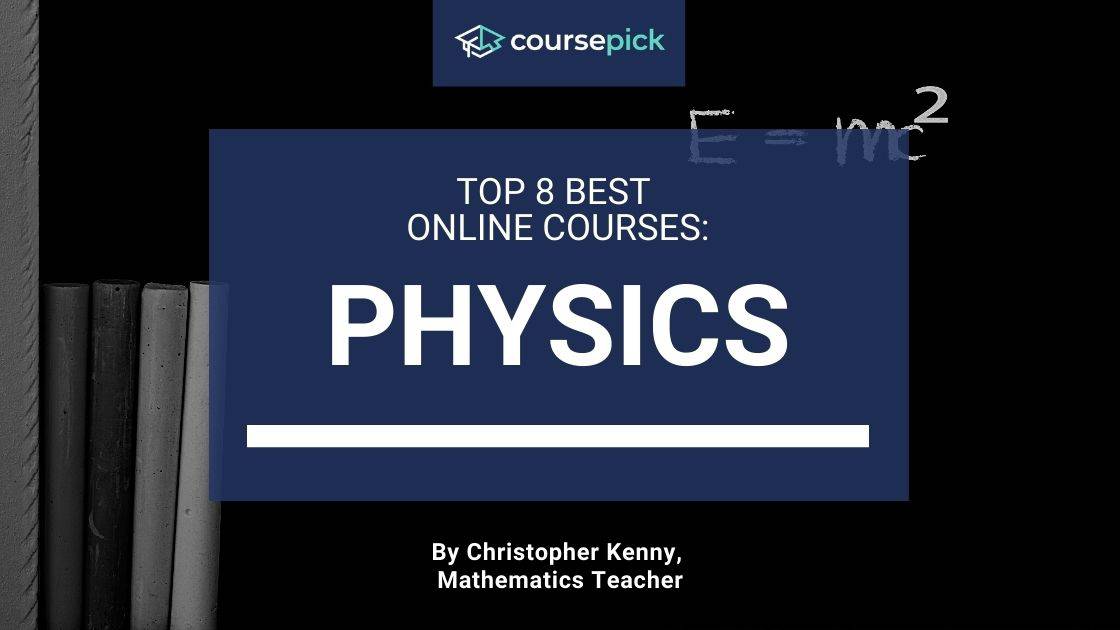
Learning science topics online is becoming more and more prevalent as time goes by in the world of technology. It is incredible that there are so many science courses available online.
One of the science courses available for students to take online is Physics.
There are multiple science courses that have a strong foundation in physics such as mechanics and quantum physics. Physics can be taken by high school or college students, but more advanced physics courses are meant to be taken by college students.
Due to the difficulty of this course, it is really important that you find a quality instructor who can explain the many topics in an understandable way. So, join me as I dive into the best physics courses available online.
Physics 100: Mastering Newton’s Laws of Motion – Dr. Eric Meloche
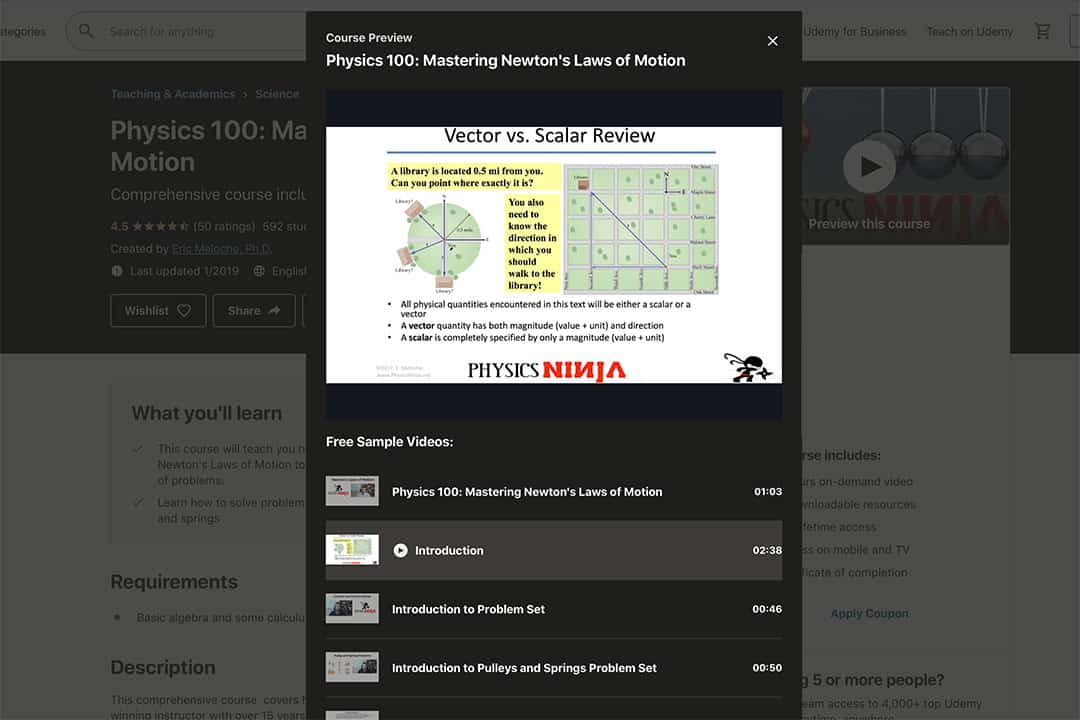
The first course is titled, “Physics 100: Mastering Newton’s Laws of Motion.”
This course was created by Dr. Eric Meloche. Dr Meloche is a physicist who has been teaching physics for over 15 years.
He has created a great physics course here with many useful features.
One feature that is very beneficial students is the nine hours of video lectures and example videos. The particularly unique thing about Dr. Meloche’s videos is the fact that none of the videos are over ten minutes long.
This is great because it helps to maintain the attention of students as they watch the videos. The short length of these videos helps students to stay engaged in the lessons as well which is great because these topics tend to get very tricky.
Also, there are separate videos reserved for only working through examples. This is very helpful to students because the more examples they see done by an instructor, the more likely students are to succeed when working on problems of their own.
Overall, I would recommend this course to any student who likes to watch short lecture videos as well as videos where the instructor works through examples in detail.
Fundamentals of Physics – STEM Academy
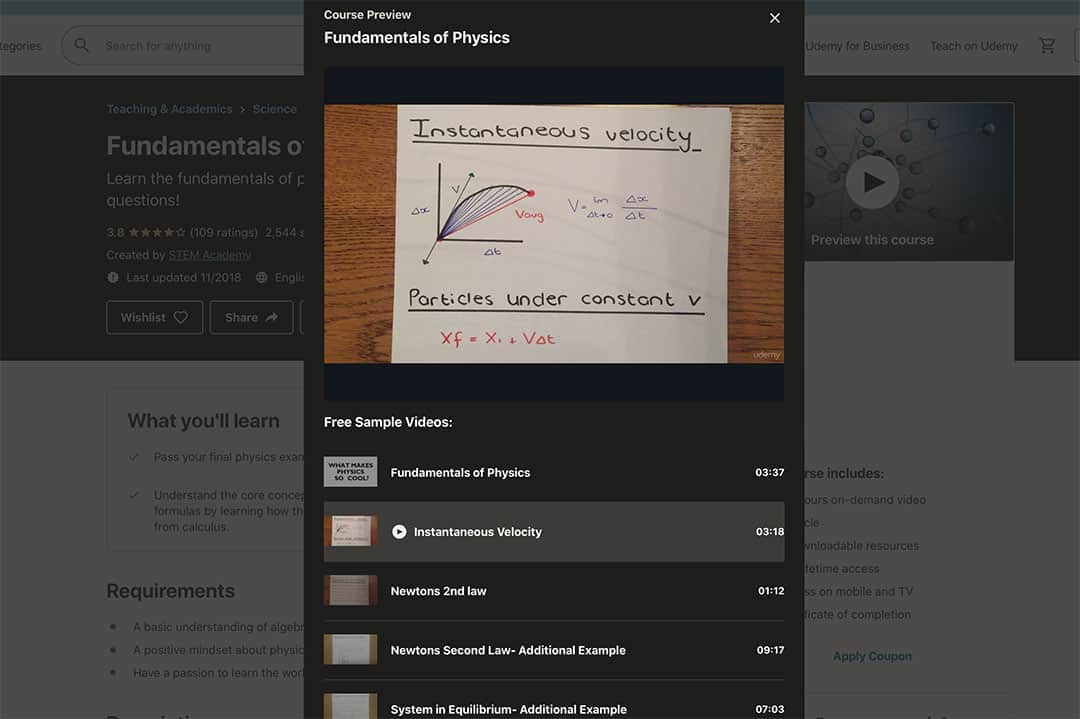
The next course is titled, “Fundamentals of Physics.” This course was created by STEM Academy.
STEM Academy is a group of scientists, mathematicians, and engineers who aim to educate students in science, technology, engineering, and mathematics. STEM Academy was created to make you love the aforementioned fields.
The first feature of this course that is particularly interesting from a mathematics standpoint is that not only does STEM Academy teach students physics content in this course, but they also offer many Calculus topics as well.
This may seem like a confusing notion for some, but Calculus can be utilized to make physics topics a little more manageable since a lot of the work done in Physics is algebra-based.
A second feature that is great for students is the fact that the videos lectures are very short.
There are five and a half hours of video lectures and the average length of each video is around five minutes or so. Much like the previously reviewed course, keeping videos this short helps maintain student engagement and attention.
I would highly recommend this course to any students who want to get an understanding of Physics along with Calculus.
Physics 1 (Algebra Based) – David Manning
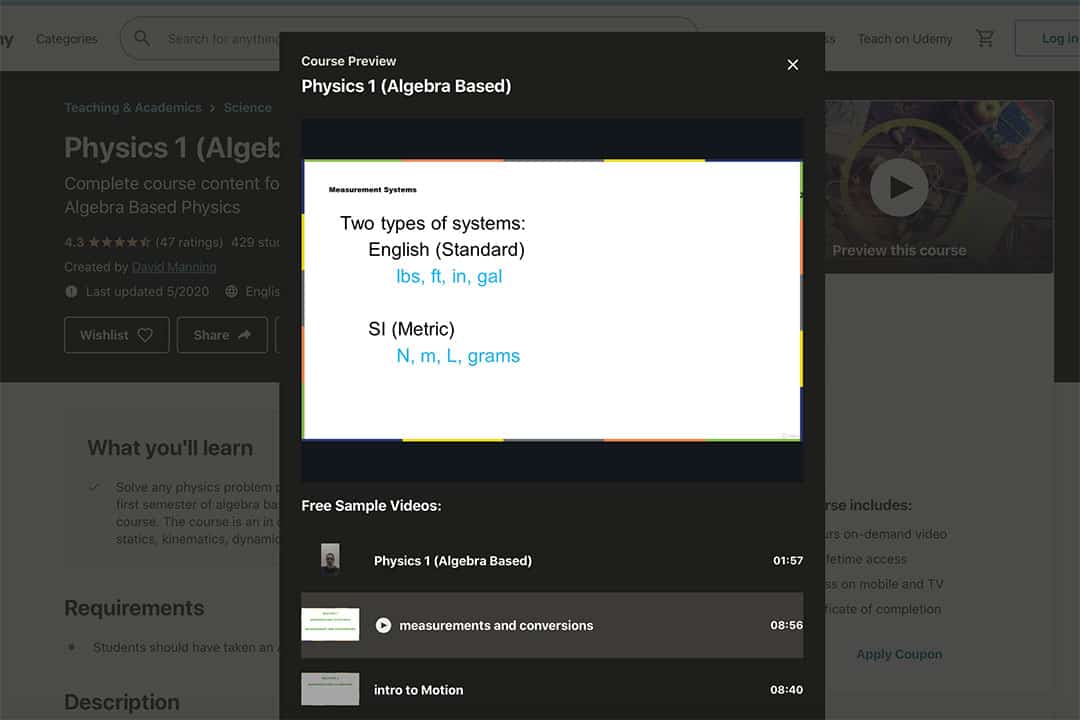
The next course is titled, “Physics 1 (Algebra Based).”
This course was created by David Manning. Mr. Manning has taught high school maths and physics as well as physics at the college level.
He taught the first ever online physics course at the college where teaches.
The first feature of this course that is beneficial to students is the five hours of video lectures made available to them. Video lectures, as in the previously reviewed course, is really helpful for students because students need clear and concise explanations to get through the challenging material.
These videos are also on the shorter side which really helps keep students’ attention. I do not think there are any practice problems made available, which I think would really be helpful as well.
I recommend this course to students who like video lectures, but like shorter videos to explain the related content to them.
Essential physics: Master classical and Newtonian mechanics – WR Training
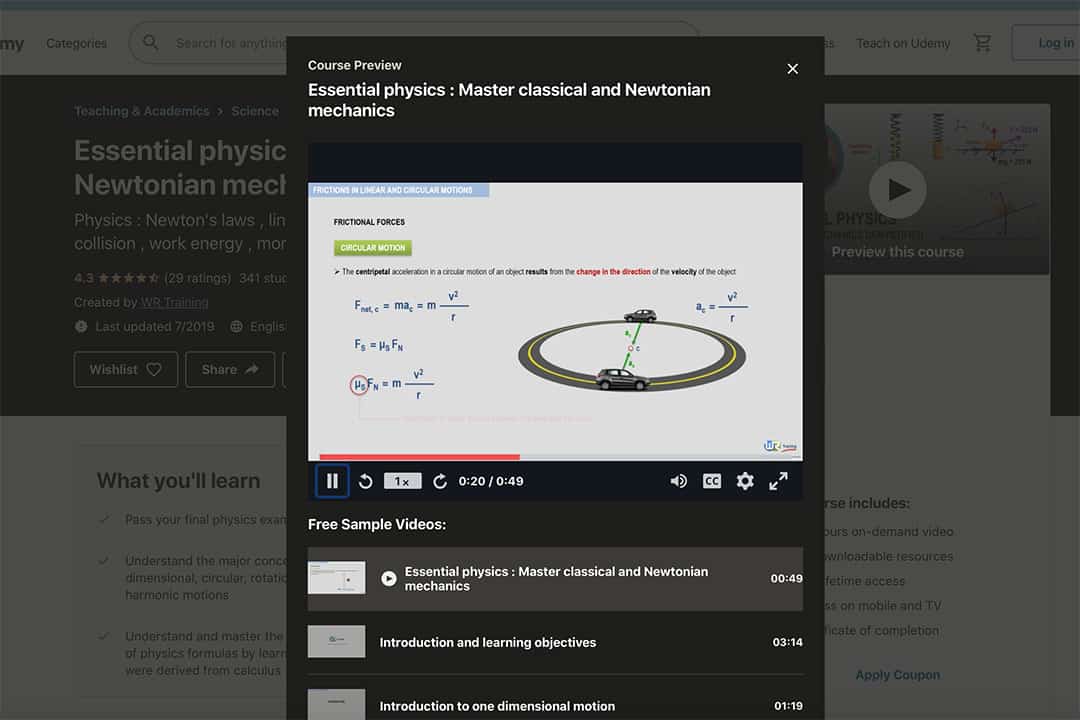
The next course is titled, “Essential physics: Master classical and Newtonian mechanics.
This course was created by WR Training. WR Training is a group of professional engineers from a variety of disciplines such as chemical and mechanical engineering.
The training methods behind this course and all of their courses are designed to enable self-paced learning, which is really important for any and all online courses.
The first positive aspect of this course is the course preview video. No one speaks during this video. The video goes through each unit and shows a quick example of each topic.
This video is great because it shows students what they can expect if they enroll in the course.
The second positive aspect of this course is they there are nearly seven and a half hours of video lectures, which helps students conceptualize the material.
Another great feature of this course is the “cliff notes” feature.
The course creators have summarized the most important information from each section and made it available for students to help them with studying the material.
Additionally, an over 200-page booklet is included with hundreds of practice problems to help students check for their understanding of the material.
Students also have the ability to ask the instructors questions in the Question and Answer section of the course. I would highly recommend this course to students who want to practice the concepts they learn as they learn them.
How Things Work: An Introduction to Physics – Louis A. Bloomfield
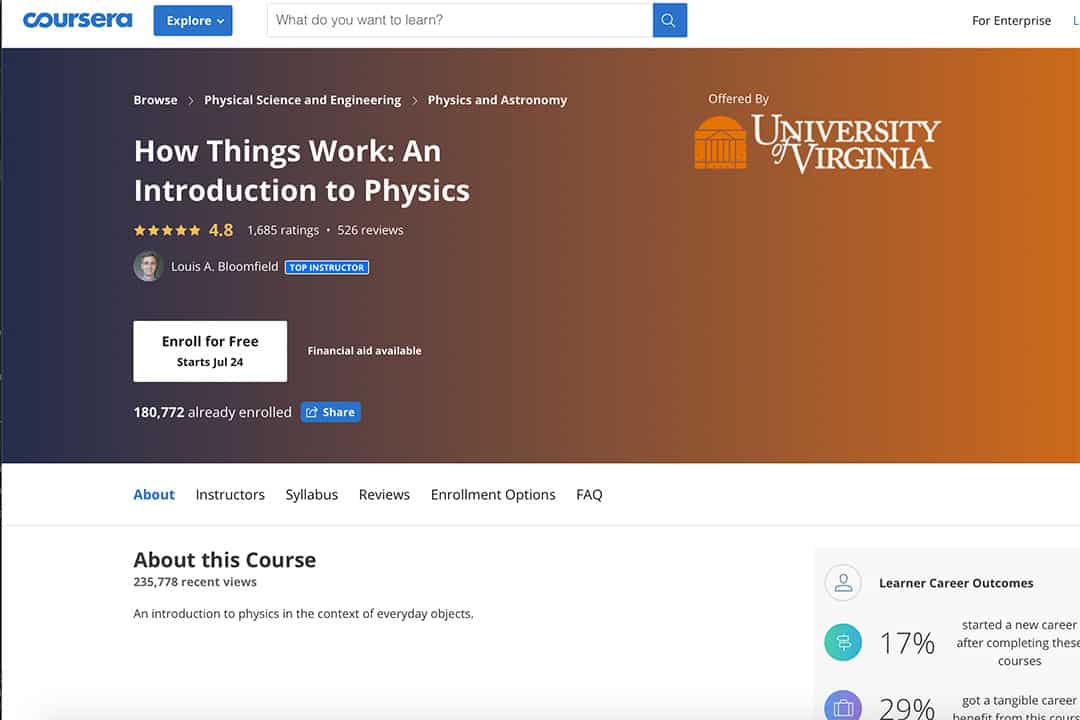
The next course is titled, “How Things Work: An Introduction to Physics.”
This course is offered by the University of Virginia. The main instructor is Louis A. Bloomfield, a professor of physics.
Much like the other courses I have reviewed, this course has over six hours of instructional videos.
A unique thing about this course is that each “week” of this course teaches a physics concept using real world examples instead of lecturing on the related concept.
Also, each week has practice exercises so students can apply the topics they are learning. There is also a final assessment at the end of the course, so students can see how well they have learned the material.
I highly recommend this course to any students who like to see how physics applies to the real world.
Preparing for the AP Physics 1 Exam – Boston University
The next course is titled, “Preparing for the AP Physics 1 Exam.”
The course is offered by Boston University.
There are several instructors for this course. They are Andrew Duffy, Mark D Greenman, Aaron Osowiecki, and Brandon Schmidt.
This course may seem to only apply to high school students because the title refers to the AP Physics Exam, but the content is applicable to any physics student.
This course has several beneficial features for students. One of these features is video lectures. However, this course also has lab experiments on video to show students how physics applies to the real world.
They even slow down the video, so students can clearly see how each experiment works.
If students are confused at any point, they can take advantage of the discussion forums to talk to the instructors or even fellow students.
I recommend this course to students who want to actually do/watch physics lab experiments.
Physics– Khan Academy
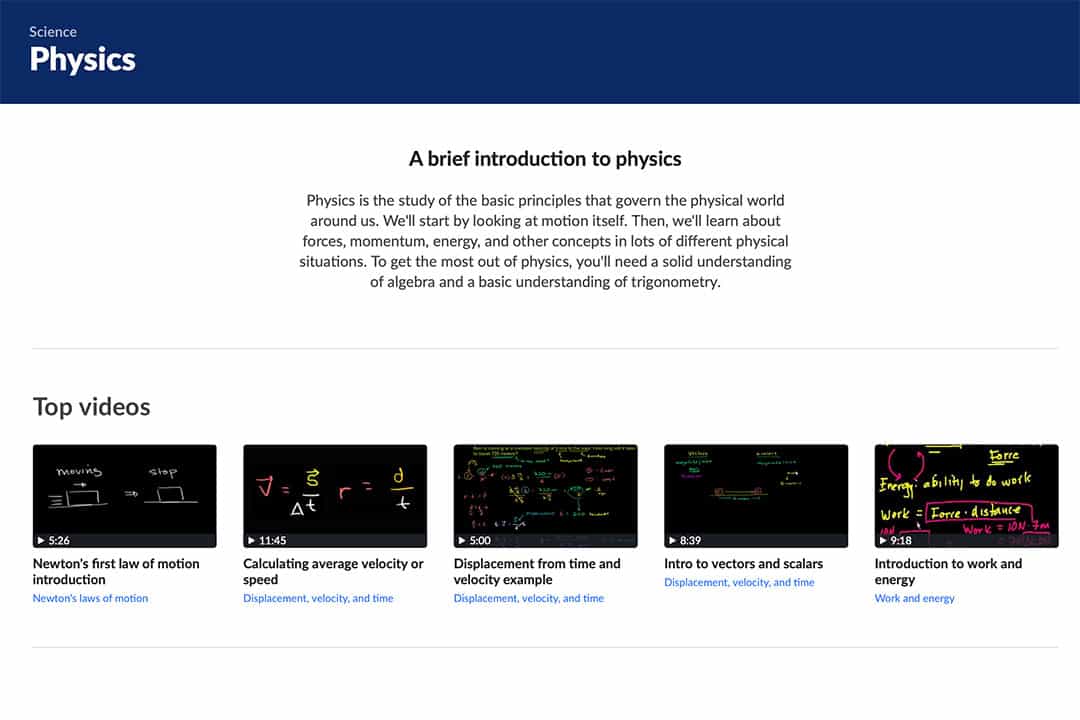
The last course is titled, “Physics.”
This course is offered by Khan Academy, a juggernaut in the online learning community.
They have a plethora of courses available on their website, and their courses are a great example of self-paced learning
As a past user of Khan Academy when I retaught myself several Calculus concepts, I can say that the way they teach the related course material is unique and fun.
In this course, there are knowledge checks and short quizzes along the way to check for student understanding of the related Physics concepts.
Passing the quizzes and knowledge checks earns “skill points.”
The great thing about the 3-4 question quizzes is that, if you get a question wrong on the quizzes, you have to take the whole quiz all over again.
While this may seem cumbrous at times, this format teaches students mastery of the material, which is ideal for a self-paced course.
Once you earn a certain amount of skill points you “level up,” which makes taking this class feel like playing a video game.
Basic Physics: A Self-Teaching Guide – Karl F. Kuhn
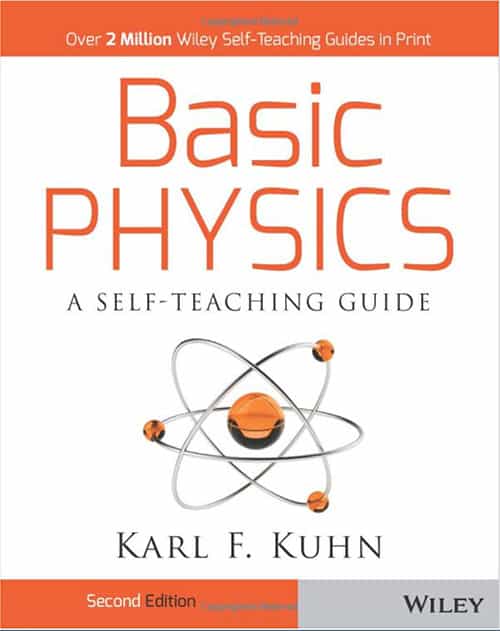
The last course is actually a book titled, “Basic Physics: A Self-Teaching Guide.”
This book was written by Karl F. Kuhn, a professor of physics at Eastern Kentucky University.
This book lets you work and learn at your own pace by providing a helpful question and answer format. The book lists objective for each chapter, which helps students determine if they can skip ahead to another chapter in the book.
Every chapter reinforces what students learn by providing end of chapter self-tests. This book shows both mathematical and non-mathematical methods of learning physics. I highly recommend this book to any students who are interested in learning physics in a self-paced format.
Now that you have read about all of the various options available to take Physics online, the following section of this article answers some frequently asked questions that are posed by potential Physics students (high school and college students alike).
Frequently Asked Questions:
What is Physics?
In a nutshell, physics is the science of how things work in the universe. It is the science of matter and energy and their interactions.
Who should take Physics?
Physics is not for the faint of heart. It should only be taken by upper classmen at the high school level or students at the collegiate level. Adults going back to school may also be able to take this course.
Can you finish this course in a month?
While it is certainly possible to finish this course in a month, It is not recommended to attempt to try to finish this course in a month because there are many unique topics in this course that require a student’s full attention to truly grasp the material. This a foundational course to higher level courses such as Quantum Physics or Particle Physics, so it is really important that students take their time with this course.
How do you prepare for Physics?
Physics really only requires a basic understanding of Algebra. If a student has some Calculus knowledge, it may make this course easier. However, it is not required for students to know Calculus. It would also be helpful if students have had experience in some science courses before taking Physics for some basic vocabular like matter or energy.
What are the benefits to taking classes online as opposed to taking them in a brick-and-mortar school?
This is a fair question. Taking a Physics classes online usually gives the student the opportunity to go at his or her own pace. Students can focus on topics that they are struggling in while advancing past concepts that might come easier to them. Students can also try to master material by doing several practice problems on their own while taking the course.
Can you skip Physics?
The answer to this question really depends on what field a particular student would like to go into. If you are wanting to become an engineer or scientist, for example, Physics is an essential course for you, but if you are going into teaching mathematics, then Physics may not be needed.
Is Physics an easy course?
This course is a challenging one and should not be considered easy at all. Students should pay special attention while taking this course because the topics can become extremely complex at times.
When am I ever going to use this material?
This a valid question but it is a question with a relatively simple answer. Physics is a great way to apply science and mathematics to the real world, and there are tons of career opportunities that utilize Physics such as engineering or applied science.
Does the word self-paced mean you are teaching yourself?
This is a very valid concern, but self-paced does not mean you are teaching yourself.
The courses that are created to be taken online are designed by professional teachers who usually include video lectures that explain the course concepts in an easily comprehensible way.
These instructors also include practice problems for students to do to apply the topics they are learning in the class with in-depth solution descriptions. Therefore, students should not feel like they are teaching themselves about Physics.
How do you study for tests?
With any math or science class, the most important thing a student can do is practice, practice, practice, and then practice some more. The more you practice, the more familiar you become with applying the geometric concepts learned in the class, which means your test scores will increase overall.
Also, doing some Physics lab experiments may also help students study for tests in this course so students can have an image of what the concepts they will be tested on look like before they take a test in Physics.
Where can I find practice tests and practice problems online outside of paying for online courses?
There is a large variety of sites where practice tests and problems are available. Here are a few good options for students to practice the related course material outside of paying for courses.
http://www.physicslab.org/asp/PracticeProblems/
http://web.mit.edu/~yczeng/Public/WORKBOOK%201%20FULL.pdf
http://www.solvephysics.com/problems_kinematics.shtml
As I stated earlier, there are countless other options and programs out there for you to practice Physics beyond the sites provided above.
Conclusion
In conclusion, no matter what online Physics course you take, it is important that the course you pick has a strong structure that focuses on teaching students how to master the concepts.
Because a lot of courses that are taught online are self-paced, students who are mastering the concepts are more likely to succeed in future higher level math courses such as Quantum Physics or Particle Physics.
Having a firm grasp of the material taught in Physics will result in a good grade in a course like Quantum Physics.
It is also important that students select a course with detailed and engaging video lessons that break down the course concepts, especially if the videos are on the longer side.
The online course that a student selects should be designed by a creative instructor who finds a way to make learning the material fun and interesting.
To succeed in any online class, you have to remain focused and motivated since there is not a physical teacher in the room with you making sure that assignments get completed on time.
Taking a great online Physics class will help any student succeed in future science courses.

I tutored full time for the Ohio Graduation Test in my home state of Ohio for one year, and I have taught Math at the high school level for over 5 years.
In my time as a high school mathematics teacher, I have taught Algebra I, Geometry, Algebra II, Statistics, and Advanced Placement Calculus.
